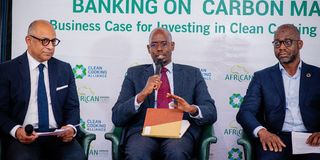African banking industry urged to invest in carbon markets

From left: Feisal Hussain, Senior Director for Innovative Finance, Clean Cooking Alliance, Paul Muthaura, CEO, Africa Carbon Markets Initiative and Franck Adjagba, Group Director of Business Development, African Guarantee Fund.
The African Guarantee Fund (AGF) and the Clean Cooking Alliance have challenged the African banking industry to invest in carbon markets.
AGF and the Clean Cooking Alliance have partnered with the UN Capital Development Fund to empower Africa’s banking industry with the knowledge and insights necessary to navigate carbon markets effectively.
Collaborating with the Kenya Bankers Association (KBA), AGF, CCA and UNCDF, at least over 100 senior bankers received crucial tips for "Banking on Carbon Markets" during a workshop that focused on financing clean cooking projects.
The workshop also focused on carbon finance business models, the intricacies of financing clean cooking projects, and their associated risk-return profiles.
Industry leaders and investors shared global evidence and practical experiences in underwriting risks related to lending to clean cooking carbon projects.
The workshop comes on the heels of the Africa Climate Summit that brought together global key players in Nairobi.
António Guterres, the UN secretary general, said during the Nairobi summit: “Africa is home to 60 per cent of the world’s best solar resources — but only two per cent of global investments in renewable energy over the last two decades. Now is the time to bring together African countries with developed countries, financial institutions, and technology companies to create a true African Renewable Energy Alliance.”
The spotlight on green and sustainable finance primarily centres on mitigating climate risk, but the untapped potential for banks to maximize opportunities through climate action is often underestimated.
In the face of mounting pressure from customers, shareholders, investors, and regulators, banks are compelled to align their corporate strategies and lending criteria with Environmental, Social, and Governance (ESG) standards.
Speaking at the workshop, Mr Patrick Lumumba, AGF Group Director of Capacity Development, emphasized that “Carbon projects have become instrumental in channelling funds across various sectors of the economy, expediting transitions towards a sustainable future.”
However, banks frequently lack comprehensive data to assess the risks and returns associated with carbon projects.
“They also lack information about effective market entry strategies, growth-oriented business models, risk management, and prudent portfolio construction practices,” added Mr Lumumba.
“Today’s workshop is a clear example of AGF’s capacity development efforts in action to enable the banking sector to venture into carbon markets by way of increasing financing of clean cooking projects,” he said.
He observed that prioritising this sector directly impacts several Sustainable Development Goals (SDGs) such as gender equality, good health and well-being, and climate action.
Mr Feisal Hussain, CCA Senior Director of Innovative Finance, noted that “Banks are essential to realizing the full potential of the carbon markets by helping to fill the financing gap needed to initiate and scale up carbon projects.”
He said this is crucial to accelerating the clean energy transition and transforming the lives of people who currently do not have access to clean cooking fuels and technologies.
“The new Partnership Platform for Clean Cooking Finance is key to this endeavour as it brings together several stakeholders with distinctive capabilities including clean cooking, de-risking investments, and capital mandate for emerging markets,” he added.
[email protected]





